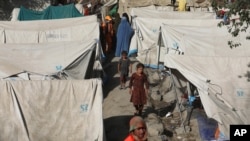The World Food Program warns acute hunger is deepening in Afghanistan and families are resorting to extreme measures to find something to eat and keep their children from starving.
Randomized phone surveys carried out between August 21 and September 5 in all of Afghanistan’s 34 provinces found that 93% of households do not have enough to eat.
World Food Program deputy regional director, Anthea Webb, says many families are teetering on the verge of absolute destitution and are employing negative coping measures to survive.
“Those are things like skipping meals or preferring to give food to children instead of adults, or limiting portion sizes to make food last longer have almost doubled. So, now there are three out of four Afghan families employing at least one if not more of those approaches,” Webb said.
Food insecurity was widespread prior to the takeover of the country by Taliban militants on August 15. Before that date, the WFP phone surveys that got underway June 17, found 81% of households were short of food. The survey found a marked deterioration in food security after August 15, following the collapse of the Afghan government and Taliban seizure of the capital Kabul.
The WFP reports 14 million people are going hungry, including 2 million malnourished children in need of special nutritional feeding to survive. The country’s economy is in shambles. People are out of work and do not have money to buy food.
Webb said a major concern is to pre-position food for millions of people before winter sets in. She said it is now a race against time to deliver lifesaving assistance to the Afghan people who need it the most before roads are cut off by snow.
“We need to be reaching 9 million people per month by November, if we are to meet our planned target of 14 million by the end of the year. We have appealed for $200 million, and a number of countries have come forward with offers of help. But we are quite literally begging and borrowing to avoid food stocks running out in October,” Webb said.
The WFP has managed to assist 6.4 million Afghans this year. Webb says it has provided nutrient-dense foods to nearly 600,000 people across the country since mid-August, including meals for tens of thousands of children and mothers.
With support of the international community, Webb said the WFP will be able to purchase and transport food to strategic locations before it is too late.




